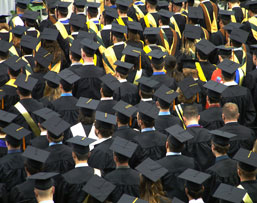China – Universities
Higher Education
Higher education in China is developing rapidly. At present, the number of regular higher education institutions (HEIs) is over 2000. “211 project” is the biggest key construction project in the field of higher education. The Chinese government gives priority to 112 “211 project” universities in terms of their investment and development. Meanwhile, “985 project” is for the development of a number of world-class universities and a number of internationally renowned high-level research universities. 39 universities enter both “211 project” and “985 project”. These “211 project” and “985 project” universities are regarded as the best universities in China.
Most regular higher education institutions (HEIs) accept self-funded overseas students and international students with Chinese government scholarship programs. Entering the 21st century, there has been a sharp rise in the number of students coming to study in China. According to a national statistical report, 328,330 students from more than 200 countries and regions studied in China in 2012.
University Departments
Generally speaking, Chinese universities comprise a series of schools, departments, institutes and some other administrative, teaching and research units. And a school can be divided into a few departments. Here is a chart of schools and departments of Tsinghua University.
(For English version see: Schools & Departments of Tsinghua University)
Studies
Chinese higher education system is almost the same as that in western countries. It can be divided into undergraduate level, MA level and PhD level.
Undergraduate level
All middle school students have to pass the national college entrance examination on June 6-8 before they become university students. The duration of undergraduate studies is four years in normal conditions. An undergraduate will be awarded a bachelor’s degree after completing all the required four-year courses.
MA level
Undergraduates participate in the national unified postgraduate entrance examination in January before they become postgraduate students. The duration of MA is 2-3 years. According to individual situations, undergraduates can choose part-time or full-time postgraduate programs. From 2013, government-supported postgraduate programs are abolished. All the postgraduates have to pay tuition and other fees.
PhD level
PhD entrance examinations are held within the scope of each university. Generally speaking, the entrance examination subjects include a foreign language and two major courses. All the postgraduates are required to get their Master’s degrees before taking the PhD entrance examinations. The duration is 3-4years.
Glossary
Higher Education
校长 (Xiao zhang, President) – person in charge of the daily management of the university
党委书记 (Dang wei shu ji, Secretary of the Party Committee) – the person who is the actual head of the university
大学 (Da xue, University)
学院 (Xue yuan, College)
理工大学 (Ligong daxue, Polytechnic)
师范大学 (Shifan daxue, University created to train graduates to be teachers)
研究所/研究院/研究中心 (Yan jiu suo/yan jiu yuan/ yan jiu zhong xin, Research centre/ research academy)
Sections
校长室 (Xiao zhang shi, President Office)
副校长室 (Fu xiaozhang shi, Vice President Office)
秘书室 (Mi shu shi, Secretariat)
教务处 (Jiao wu chu, Academic Affairs Division)
总务处 (Zong wu chu, General Affairs Division)
人事室 (Ren shi chu, Personnel Office)
系主任办公室 (Xizhuren bangongshi, Office of the Department Head)
学生会 (Xue sheng hui, Students’ union / association)
信件室 (Xinjianshi, Mail Room)
计算机室 (Jisuanjishi, Computer Room)
Titles
副校长 (Fu Xiaozhang, Vice-chancellor)
教务长 (Jiaowuzhang, Dean of studies)
系主任 (Xizhuren, Chairman /chairperson)
副主任 (Fu Zhuren, Vice-chairman)
研究生 (Yanjiusheng, Graduate student / post-graduate student)
博士生 (Bo shi sheng, PhD student)
硕士生 (Yan jiu Sheng, Master student)
本科生 (Ben ke Sheng, Undergraduate student)
Departments
表演系 (Biaoyanxi, Acting Department)
艺术系 (Yishuxi, Arts Department)
考古学系 (Kaoguxuexi, Department of Archaeology)
中文系 (Zhongwenxi, Department of Chinese Language and Literature)
舞蹈系 (Wudaoxi, Department of Dance)
历史系 (Lishixi, Department of History)
新闻系 (Xinwenxi, Department of Journalism)
图书馆学系 (Tushuguanxuexi, Department of Library Science)
文学系 (Wenxuexi, Department of Literature)
东方语言学系 (Dongfang Yuyanxue xi, Department of Oriental Languages and Literature)
哲学系 (Zhexuexi, Department of Philosophy)
雕塑系 (Diaosuxi, Department of Sculpture)
戏剧系 (Xijuxi, Department of Theatricals)
国画系 (Guohuaxi, Department of Tradition Chinese Painting)
西方语言系 (Xifang Yuyan xi, Department of Western Languages)
外语系 (Waiyuxi, Foreign Languages Department)
Courses
电影美学 (Dianying Meixue, Aesthetics of Cinema)
古代文学作品赏析 (Gudai Wenxue Zuopin Shangxi, Analytical Application of Ancient Literary Works)
古汉语 (Gu Hanyu, Ancient Chinese)
科学技术史 (Kexue Jishushi, History of Science & Technology)
欧洲古典音乐 (Ouzhou Gudian Yinyue, European Classical Music)
外国文学 (Waiguowenxue, Foreign Literature)
文学概论 (Wenxue Gailun, Introduction to Literature)
音乐欣赏 (Yinyue Xinshang, Music Appreciation)
应用文写作 (Yingyongwen Xiezuo, Applied Writing)
哲学 (Zhexue, Philosophy)
职业道德伦理 (Zhiye Daode Lunli, Professional Ethics)
中国近代史 (Zhongguo Jindaishi, Modern Chinese History)
中国通史 (Zhongguo Tongshi, General History of China)
语言学概论 (Yuyanxue Gailun, Introduction to Linguistics)
比较文学 (Bijiao Wenxue, Comparative Literature)
报刊编辑学 (Baokan Bianjixue, The Editorial Studies of Printing Media)
大众传播学 (Dazhong Chuanboxue, General Introduction of Mass Communication)
广播电视学 (Guangbo Dianshixue, Introduction to TV and Broadcasting)
编辑学概论 (Bianjixue Gailun, Basic Theories of Edition)
中国社会思想史 (Zhongguo Shehui Sixiangshi, The history of social thought in China)
Others
教学大纲 (Jiaoxue Dagang, Teaching program / syllabus)
教学内容 (Jiaoxue Neirong, Content of courses)
学习年限 (Xuexi Nianxian, Period of schooling)
学历 (Xueli, Record of formal schooling)
学年 (Xuenian, School/academic year)
学期 (Xueqi, Term / semester)
学分 (Xuefen, Credit)
毕业实习 (Biye Shixi, Graduation field work)
毕业典礼 (Biye Dianli, Graduation ceremony; commencement)
毕业证书 (Biye Zhengshu, Diploma / graduation certificate)
补考 (Bukao, re-sit examination)
Web Links
Ministry of Education of the People’s Republic of China
Chinese Service Center for Scholarly Exchange
Number of higher education institutions
List of different kinds of Colleges and Universities
2012 national concise statistical report for foreign students studying in China
Information for studying in China
Chinese institutions admitting international students under Chinese government scholarship programs (164universities)
A model of department layout (Chinese version)
Schools & Departments of Tsinghua University (English version)
